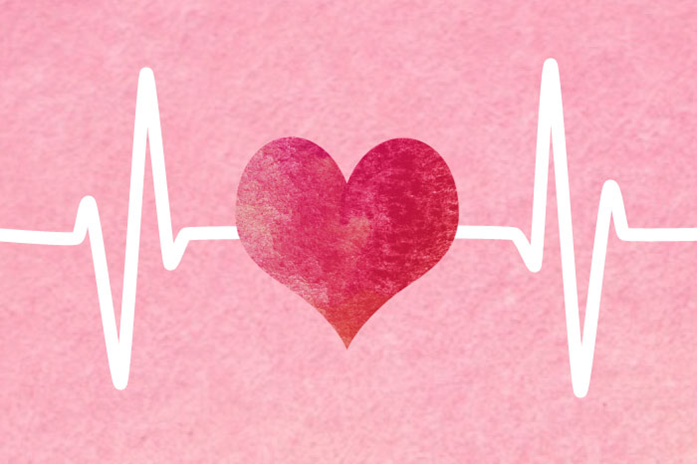
February is heart health month. Makes sense, right? So how much do you know about your heart? These fun heart facts are from Diana Wells, for Healthline:
(The first three are absolutely mind-blowing when you stop and actually think about them – WOW!)
• Your heart will beat about 115,000 times each day.
• Your heart pumps about 2,000 gallons of blood every day.
• If you were to stretch out your blood vessel system, it would extend over 60,000 miles.
• An electrical system called the cardiac conduction system controls the rhythm of your heart.
• The heart can continue beating even when it’s disconnected from the body.
• The average heart is the size of a fist in an adult.
• The human heart weighs less than 1 pound.
• A man’s heart, on average is 2 ounces heavier than a woman’s heart.
• A woman’s heart beats slightly faster than a man’s heart.
• The beating sound of your heart is caused by the valves of the heart opening and closing.
• Laughing is good for your heart. It reduces stress and gives a boost to your immune system.
The Center for Disease Control and Prevention reports, “About 610,000 people die of heart disease in the United States every year–that’s 1 in every 4 deaths.” It goes on to say that in the United States, “Heart disease is the leading cause of death for both men and women.” This means education and prevention are critical regarding heart health.
It is important to know the signs of a heart attack. The American Heart Association provides this list of warning signs:
1. Uncomfortable pressure, squeezing, fullness or pain in the center of your chest. It lasts more than a few minutes, or goes away and comes back.
2. Pain or discomfort in one or both arms, the back, neck, jaw or stomach.
3. Shortness of breath with or without chest discomfort.
4. Other signs such as breaking out in a cold sweat, nausea or lightheadedness.
5. As with men, women’s most common heart attack symptom is chest pain or discomfort. But women are somewhat more likely than men to experience some of the other common symptoms, particularly shortness of breath, nausea/vomiting and back or jaw pain.
Elizabeth Banks stars in this humorous short film, “Just a Little Heart Attack” to raise awareness about the signs and symptoms of a heart attack, especially for women: https://youtu.be/t7wmPWTnDbE
The American Stroke Association, a division of the American Heart Association, emphasizes this important point, “The link between heart disease and stroke is significant. Several types of heart disease are risk factors for stroke. Likewise, stroke is a risk factor for coronary heart disease.” The ASA also stresses this staggering statistic, “Stroke is the No. 5 cause of death and leading cause of disability in the United States.”
The acronym for remembering the symptoms of a stroke is FAST. The American Heart Association provides this list of warning signs:
F—FACE DROOPING. Does one side of the face droop or is it numb? Ask the person to smile. Is the person's smile uneven or lopsided?
A—ARM WEAKNESS. Is one arm weak or numb? Ask the person to raise both arms. Does one arm drift downward?
S—SPEECH. Is speech slurred? Is the person unable to speak or hard to understand? Ask the person to repeat a simple sentence.
T—TIME TO CALL 9-1-1. If the person shows any of these symptoms, even if the symptoms go away, call 9-1-1 and get them to the hospital immediately.
Sarah Weiss is an inspiring 12-year-old who lives in Omaha, Nebraska, and survived a stroke in 2018. You definitely want to watch this remarkable video about the importance and power of FAST: https://youtu.be/GzfDxcQap8M
UNL offers CPR/AED/First Aid training at the Recreation Center. You can sign up for training here: https://shopcrec.unl.edu/wbwsc/webtrac.wsc/search.html?module=ar&keyword=aed
For a funny cliff note version of how to do CPR, watch this clip: https://youtu.be/pk53b_eweyk
Knowing how to do CPR (cardiopulmonary resuscitation) literally saves lives every single day. Mike Alvarez lives in Lincoln, Nebraska and is a heart attack survivor. Listen to his incredible story here: https://youtu.be/iZlwYD3IpqI
Your heart is working tirelessly for you 24/7. Isn’t it time to show your heart some love?
This link tells you how to shop for heart-friendly foods by looking for the American Heart Association’s Heart-Check logo on certified items in your grocery store. It also has an abundance of scrumptious-sounding Heart-Check certified recipes like, “Avocado Banana Pancake Stacks” and “Chobani Mashed Potatoes” to try: https://www.heart.org/en/healthy-living/healthy-eating/heart-check-foods
Your heart is amazing. So this Valentine’s day instead of giving away your heart, consider keeping it. Keeping it healthy. Keeping it strong. Choosing to make heart-healthy choices could be the best gift you give yourself and your valentine!
Listen to your heart. Look after your heart. Love your heart. Your heart loves you.
Additional Heart Health Resources and Clips:
This short clip describes the difference between good cholesterol (HDL) and bad cholesterol (LDL): https://youtu.be/4YRWcn_KU-Y
Sweet Potato Nachos – YUM! These sound delicious: https://youtu.be/fk-cast8aEk
Abby’s Story – Infant CPR Saves Lives: https://youtu.be/DvYoZz_MuBM
American Heart Association in Nebraska: http://www.heart.org/en/affiliates/nebraska/nebraska
Americans Unprepared for Workplace Cardiac Emergencies: https://news.heart.org/americans-unprepared-for-workplace-cardiac-emergencies
Citations:
1. Wells, Diana. “Fun Facts About the Heart You Didn’t Know: How the heart works.” Healthline. 6 July 2017. http://www.healthline.com/health/fun-facts-about-the-heart#1.
2. “Warning Signs of a Heart Attack.” American Heart Association. Reviewed 30 June 2016. http://www.heart.org/en/health-topics/heart-attack/warning-signs-of-a-heart-attack.
3. “How Cardiovascular Stroke Risks Relate.” American Stroke Association, A division of the American Heart Association. Reviewed 10 Dec. 2018. http://www.strokeassociation.org/en/about-stroke/stroke-risk-factors/how-cardiovascular-stroke-risks-relate.
4. “About Stroke.” American Stroke Association, A division of the American Heart Association. http://www.strokeassociation.org/en/about-stroke.
Disclaimer: These statements are not intended to diagnose, treat or cure any condition. Always check with your doctor before making lifestyle changes, especially if you have a medical condition.